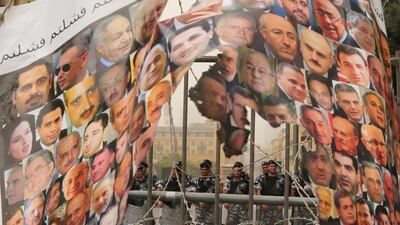This past weekend, a leading Christian politician, Gebran Bassil, visited the Chouf mountain region that has, for decades, been the electoral stronghold of Druze leader Walid Jumblatt. Mr Bassil was preparing for Lebanon's parliamentary elections, scheduled to be held in May 2018, and his tour said something about the country's new election law.
This year, parliament passed a law based on proportional representation, which was a revolution of sorts in Lebanese politics. The intention was not so much to open the political landscape to hitherto unrepresented political groups (though this law may do so), but rather, to challenge the control of electoral districts by certain powerful national politicians.
The reason for this is that the old system, based on open lists for elections held on a winner-take-all basis at the level of the qada, or small administrative district, allowed influential politicians to secure victories for most or all of their candidates, giving them large parliamentary blocs. By undermining that and allowing rivals to enter parliament, the proportional system will effectively weaken these leaders’ representation.
_____________________
Read more on Lebanon
Lebanon passes first state budget in 12 years
Lebanon's prime minister meets Saudi crown prince amid tensions over Hizbollah
US House of Representatives unanimously passes sanctions on Hizbollah
_____________________
This is hardly fortuitous. One of the main backers of the new law was Hizbollah, which anticipated that proportional representation would fragment parliament and in that way, ensure that the party would face no concerted opposition to its political priorities in the future. Indeed, the biggest relative losers are expected to be two of the politicians who once were part of the March 14 alliance opposed to Hizbollah, namely Mr Jumblatt and the current prime minister, Saad Hariri.
However, the proportional law may also do something else. It will compel leading politicians in most districts to form alliances with their major potential rivals in the constituencies that they dominate in order to secure significant majorities for the joint lists that are formed. Cross-political alliances can only reinforce national conciliation.
That is why Mr Bassil went to the Chouf, and it is why Mr Jumblatt had no choice but to welcome him to the region. The Druze leader realises that Mr Bassil's Aounist movement has support among many Christians in the Chouf, so it is in his interest, if only to preserve Christian-Druze amity, to form a joint list with the Aounists, and perhaps another leading Christian party with support, the Lebanese Forces.
While Mr Jumblatt will not run himself (his seat will be taken over by his son), he does seek to retain a prominent role in the Chouf as the sponsor of post-war Christian-Druze reconciliation there. That means that while he may have to accept several Christian candidates on the list he sponsors who are not beholden to him, and who belong to political parties he has considered rivals in the past, the Druze leader will still be regarded as the main power broker in the Chouf region.
One question is what will happen to the two main Shiite parties, Hizbollah and the Amal Movement? Because the two have considerable sway over their community, the likelihood that smaller parties will make a breakthrough into parliament at their expense in mainly Shiite districts seems less likely, though not impossible. That is why there has been talk that the two will form an alliance and quietly back friendly rival lists, to ensure that anyone entering parliament will not truly oppose them.
Indeed, such a tactic may be attempted by other politicians as well. But for it to work, politicians or parties have to have broad power within their electoral districts and sects, which almost nobody other than Hizbollah and Amal enjoys. Even Mr Jumblatt, whose power over the Druze is uncontested, only controls approximately a third of the vote in the Chouf that is Druze, which means he has to agree with the third of the electorate that is Christian and the third that is Sunni Muslim to win.
_____________________
Read more on Lebanon in Opinion
Israel's simplistic Hizbollah-Lebanese army narrative serves only to set a collision course
Moderate Hariri faces economic problems and political obstacles
Squeezing Hizbollah and its paymasters in Iran can only result in relief for their victims
_____________________
A fragmented parliament will benefit Hizbollah, which is not to Lebanon’s advantage. However, beyond that, it could shake up a political system that has long been closed to those who were not members of the political elite. In that regard, it could be an opening that is a boon for civil society reformists who decide to enter parliament in defence of a programme. While their chances will always be limited, the system has not yet been tested to see in what ways independents might gain.
One politician who can probably be expected to suffer from the law is Mr Hariri. Gone are the days when the prime minister could win the largest bloc in parliament thanks to the widespread support he had within his Sunni community. His absence from Lebanon between 2011 and 2016 lost him much support, while his economic problems undermined his powers of patronage. If one had to predict a big loser through the new law, Mr Hariri may be that person.
The reality is that the major political forces in Lebanon supported the law either because their political interests forced them to go along with it, such as Mr Hariri, or because they thought it would weaken their rivals, as did Hizbollah. However, at a time when the political class is regarded with widespread disdain by many Lebanese, the law may pack some surprises that the politicians failed to predict.
Michael Young is editor of Diwan, the blog of the Carnegie Middle East programme, in Beirut


